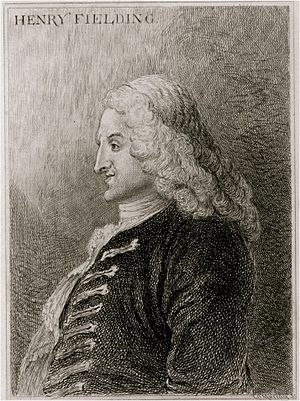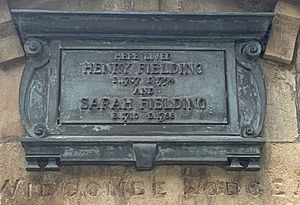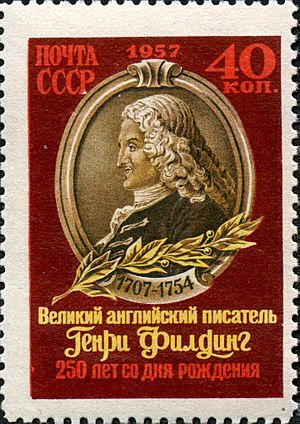Henry Fielding facts for kids
Quick facts for kids
Henry Fielding
|
|
|---|---|
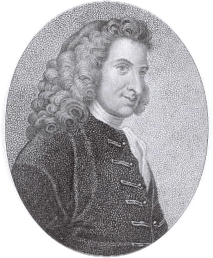 |
|
| Born | 22 April 1707 Sharpham, Somerset, England |
| Died | 8 October 1754 (aged 47) Lisbon, Kingdom of Portugal |
| Pen name | "Captain Hercules Vinegar", "H. Scriblerus Secundus"; some work published anonymously |
| Occupation | novelist, dramatist and essayist |
| Nationality | English |
| Education | Eton College |
| Period | 1728–1754 |
| Genre | comedy, satire, picaresque |
| Literary movement | Enlightenment, Augustan Age |
| Relatives | Sarah Fielding, John Fielding |
Henry Fielding (born 22 April 1707 – died 8 October 1754) was a famous English writer. He wrote funny novels, plays, and essays. He is especially known for his clever humor and satire, which is a way of making fun of things to show their flaws. His most famous novel, Tom Jones, is still very popular today.
Henry Fielding and another writer named Samuel Richardson are often seen as the people who helped create the traditional English novel. Besides writing, Fielding also played an important role in the history of law enforcement. As a judge, he helped start the Bow Street Runners, which was one of London's first full-time police forces.
Contents
Early Life and Education
Henry Fielding was born on 22 April 1707 in Sharpham, Somerset, England. He went to Eton College, a famous school, where he became good friends with William Pitt the Elder, who later became a very important politician. Henry's mother passed away when he was 11 years old.
After school, in 1728, Fielding traveled to Leiden in the Netherlands to study classic literature and law at the university. However, he ran out of money and had to return to London. There, he started writing plays for the theatre to earn a living.
Becoming a Writer
When Henry Fielding first started writing, he often used different "voices" or fake names. Sometimes he used a serious fake name, like a newspaper writer, and other times he used a funny, ironic character, like a satirist.
Some of his plays strongly criticized the government and the Prime Minister, Sir Robert Walpole. Because of this, a new law called the Theatrical Licensing Act was passed in 1737. This law made it much harder to put on political plays. After this law, it was almost impossible to write political satire for the stage.
So, Fielding stopped writing plays and went back to his law studies to support his wife, Charlotte Craddock, and their two children. He became a barrister, which is a type of lawyer, in 1740.
Even though he was a lawyer, Fielding never stopped writing. He continued to write political satire and make fun of current art and literature. For example, his play The Tragedy of Tragedies was very successful when it was printed. He published it under the name H. Scriblerus Secundus, linking himself to a group of famous satirists like Jonathan Swift and Alexander Pope. He also wrote for different newspapers and journals.
From 1734 to 1739, Fielding wrote articles for a newspaper called The Craftsman, which was against the Prime Minister, Sir Robert Walpole. His friend George Lyttelton supported him. Fielding used his writing to speak out against bribery and corruption in British politics.
Fielding started writing novels in 1741. He was inspired (and a bit annoyed) by the success of another writer, Samuel Richardson, and his novel Pamela. Fielding wrote a funny parody of it called Shamela.
He then wrote Joseph Andrews (1742), which was an original story about Pamela's brother. In 1743, he published The Life and Death of Jonathan Wild, the Great. This book was a satire that compared Prime Minister Walpole to Jonathan Wild, a famous gang leader and criminal. Fielding suggested that Walpole's constant desire for power was like a criminal's ambition.
His most famous and important work is The History of Tom Jones, a Foundling (1749). It's a detailed and very funny novel about a young boy who is found as a baby and grows up to have many adventures before finding his true family and fortune.
His Sister, Sarah Fielding
Henry's younger sister, Sarah, also became a successful writer. Her novel The Governess, or The Little Female Academy (1749) is believed to be the first English novel written specifically for children.
Family Life
Henry Fielding married Charlotte Craddock in 1734. She passed away in 1744. Later, he based the main female characters in his novels Tom Jones and Amelia on her. They had five children together, but sadly, only one daughter, Henrietta, lived to be an adult, passing away at 23.
Three years after Charlotte's death, Fielding married her former maid, Mary Daniel. They had five children together, but three daughters died young. Their two sons were named William and Allen.
Judge and Police Founder
Because Henry Fielding was always against the Jacobites (a political group) and supported the Church of England, he was appointed as London's chief judge a year later. Even though he lived in a time when society could be unfair and corrupt, he became known for being a fair judge. He was honest and cared about people who turned to crime because of difficult social situations.
Working with his younger half-brother John, Henry helped create what some call London's first police force, the Bow Street Runners, in 1749. This group helped to catch criminals and keep the peace in London.
In 1752, Fielding started a newspaper called The Covent-Garden Journal, where he continued to write about current events and argue with other writers. He also wrote about important social issues, like how to help the poor.
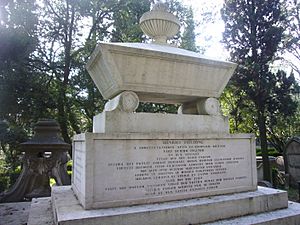
In the 1750s, while Fielding was working hard for justice, his health got much worse. He suffered from illnesses like gout and asthma. In 1754, he traveled to Lisbon, Portugal, hoping to find a cure, but he passed away there two months later. His grave is in the British Cemetery in Lisbon.
Selected Works
Novels
- Shamela – 1741
- The History of the Adventures of Joseph Andrews and his Friend, Mr. Abraham Adams – 1742
- The Life and Death of Jonathan Wild, the Great – 1743
- The History of Tom Jones, a Foundling – 1749
- Amelia – 1751
Selected Plays
- Love in Several Masques (1728)
- Tom Thumb the Great: A Burlesque Tragedy (1730)
- The Author's Farce; and The Pleasures of the Town (1730)
- The Tragedy of Tragedies: or the Life and Death of Tom Thumb the Great (1731)
- The Mock Doctor: or The Dumb Lady Cur'd (1732)
- The Modern Husband (1732)
- Pasquin (1736)
- The Historical Register for the Year 1736 – 1737
See also
 In Spanish: Henry Fielding para niños
In Spanish: Henry Fielding para niños
 | DeHart Hubbard |
 | Wilma Rudolph |
 | Jesse Owens |
 | Jackie Joyner-Kersee |
 | Major Taylor |


